Your donation will support the student journalists of Carmel High School - IN. Your contribution will allow us to purchase equipment and cover our annual website hosting costs.
Students assess how family dynamics, roles have changed due to COVID-19
August 13, 2020
Prior to March 14, senior Alana Blumberg’s daily life would often consist of staying at her dad’s house with her younger sister while bearing the same responsibilities most students have—homework, projects, and tests—as well as some other chores around the house.
“I was pretty involved around the house prior to COVID-19,” Blumberg said. “Though my parents are split and are seeing other people, most of the time they were the only adult figure in the house, so I’d help them by splitting responsibilities like laundry and dishes.”
However, since the district shutdown on March 14 as well as the state-wide stay-at-home order issued on March 23, Blumberg’s responsibilities have completely changed both in quantity and type, completely shifting the family dynamics.
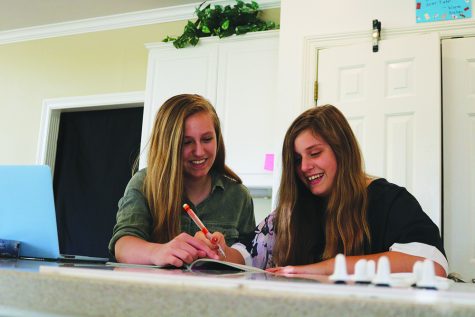
“It’s very interesting to see how COVID completely changed and gave me more responsibilities; I never thought I’d be wiping down groceries or going to multiple stores to find certain supplies for our pets.”
Even more so, her responsibilities have varied from house to house. As Blumberg said, this is because since quarantine, she has seen her mom more often which has completely changed her pace of life.
“Since my parents are split, I spent most of my time in Carmel while my mom stays in Sharpsville. Once quarantine started, though, I started to see her a little more,” Blumberg said. “So at my dad’s, life has rapidly changed. Now that my dad works from home, it makes life for him more busy at home, so the things he used to do I’ve now assumed responsibility for. For example, now I’ll go grocery shopping for the family. At my mom’s though, nothing really changed, but the motion of everything was definitely heightened. She’s a flight attendant, so hygienic things, like showering, are a lot more intense because being a flight attendant is a very high risk job.”
On top of assuming more chores around the house previously primarily done by her parents, Blumberg, as the middle child, has assumed more duties in caring for her younger sister.
“Most of the time, she’d (Blumberg’s younger sister) ask my mom for help on the phone with math homework, but now because my parents are a lot more busy and low-energy with the pandemic, I’ve had to step in and kind of fulfill that role.”
This situation is far from unique to Blumberg. According to the Times Magazine, “Many (teens) are also dealing with illness or loss of income within their families, or the frequent absence of a parent who is an essential worker, forcing them to take on more demanding roles at home.”
Despite having a different family situation than Blumberg, junior Leo Schneider, an only child, has experienced similar changes in his family dynamics that the Time Magazine cites as a general trend among many teenagers.
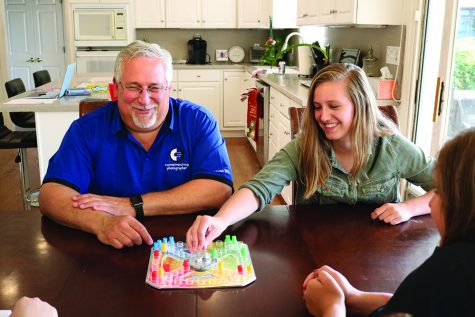
“Before quarantine I already had many responsibilities—my family makes sure each person has a responsibility around the house. So for example, I would be in control of the dishes, dishwasher, vacuuming, and would sometimes have to help with yard work,” Schneider said. “Since the pandemic, I’ve gotten more responsibilities to do since less of my energy is needed in other places like school. So each morning I would be handed an even bigger list of chores and activities that needed to be completed.”
As confirmed by Amy Rexroth, clinical psychologist and owner of Carmel Psychology, this pandemic has especially strained the role of teenagers, something the media and research tend to overlook with their focus primarily on parents and adults.
“When we peel apart all of the family dynamics, everyone is dealing with the loss of what they expected life to be. A lot of people don’t realize it, but highschoolers have really been put in a tough position both to babysit, navigate, and deal with their own trauma during this time,” Rexroth said.
But these heightened roles assumed by many teenagers have shed light on another aspect: family bonding and dynamics.
“We’ve seen both good and bad trends during this time,” Rexroth said. “Many of the kids I talk to tell me that they’ve really appreciated having more old-fashioned family time. They’ve gone on bike rides, walks, board games, and other activities they haven’t had time to do when we still had extracurriculars. But some of the challenges definitely include communication; we are all going through such novel times where we have no idea what to expect, communication can be tough within your family.”
Blumberg said she can attest to the good trends seen with family dynamics.
“I’ve especially gotten closer with my siblings because all of our activities are canceled and we’ve had to spend more time together, so it’s interesting to see how much more interactive we’ve all become with one another,” Blumberg said. “Since my older sister just started her first year at IU, it was weird seeing her come back early due to canceled trips, but the house definitely became a lot more lively and changed with her back.” Click here to read a column by Marvin Fan about summer vacation being for spending time with family and friends.
On the other hand, Schenider said he has experienced some of the more negative trends explained by Rexroth.
“Throughout this quarantine, my family has been really stressing me out about trying to become closer to each other,” Schneider said. “While this break has definitely allowed for families to get closer, this has kind of done the opposite for me since we are all trying to find new ways to fill the time and they often conflict with one another.”
In the end though, the bonding and increased family time spent that has come as a result of quarantine has provided valuable memories and lessons that Rexroth states will benefit teenagers in the long run.
“We are learning important life skills that there wasn’t time to focus on when we were running at such a vigorous pace before,” Rexroth said. “For example, spending time, bonding, communicating, and navigating family dynamics are skills and things that are going to carry on far beyond this. Especially because people have been realizing that the slower pace of life has really showed tenderness with spending time with families, these interactions and memories will really be held on to and will be a more permanent change even after this passes.”
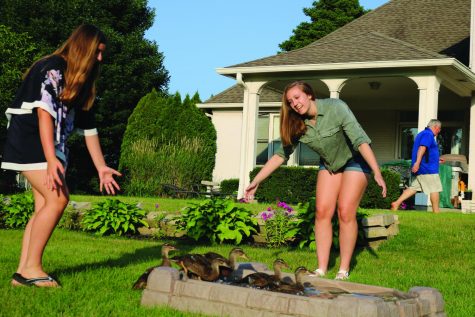
However, the pandemic has not only provided benefits for teenagers, but also serious negative implications. In fact, studies show that although they are less likely to suffer the most severe health effects of COVID-19, teenagers and young adults are feeling the pandemic’s social impact more acutely than any other age group.
According to Pew Research Center, teenagers and young adults were more likely than any other age group to experience high psychological distress when thinking about the outbreak. Those aged 16 to 24 are also disproportionately more likely to face COVID-19 layoffs because they make up 24% of employment in higher-risk industries such as restaurants, retail and transportation.
“I think with the teenage group, this is probably one of the first exposures to a crisis as young adults, so this will definitely provoke a lot of distress, but can also later provoke a resilient attitude if handled correctly,” Rexroth said. “So I think we’re really going to get some strong growth out of this.”
For Schneider specifically, one major concern has been the lack of social interaction.
“I’ve really had no major worries except for how it would feel to see people again and how much they’ve changed,” Schneider said. “It’s interesting because I would say I’ve become more introverted since quarantine because I was forced to adapt to less interaction. It was hard at first because before, for example, I loved to see people and party on the weekend, but now I’m able to enjoy more things that I can do alone.”
According to Rexroth, for those who have been struggling during quarantine with worries and anxieties, there are easy ways to convert the negative and anxious worries common among many teenagers to a more positive growth.
“First off, it’s really important to identify any anxieties,” Rexoth said. “Remember that there are no wrong emotions, especially during this time. It’s important to properly point out your feelings and tell yourself ‘This is awful, but I’m going to get through it.’ Sit in your bad feelings for a bit and come to terms with it, then get back in the game.”
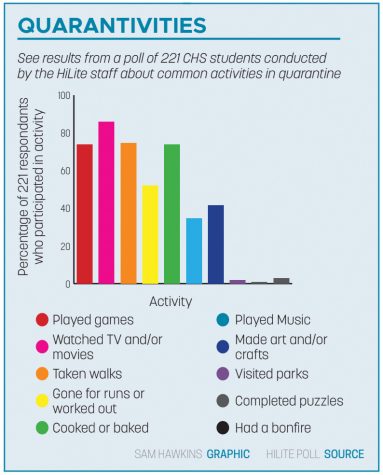
Different methods of coping and relaxation during this pandemic can manifest in many different forms. For Schneider specifically, he said he likes to take time for himself and take a step back from the many responsibilities he’s had to take on during this time.
“I like to ease the worries by being a free spirit. Now that there’s really no true responsibilities except for my chores, I enjoy getting out of that routine life and being adventurous, just to forget about any worries I might have. Just doing what I enjoy is the key, and finding ways to better myself always makes me feel a bit better.”
Blumberg reacts similarly to the increased stresses as Schneider: “I’ve been also taking more time to focus on myself, oftentimes just in my bedroom,” Blumberg said. “Thanks to the free time we’ve had during quarantine, I’ve seen myself have a bigger role in both the family and personal aspect of life.”
Despite the obvious negative implications that have come as a result of COVID-19, both Blumberg and Schneider said they have cherished the unpredictable shift in family dynamics that have accompanied the entire pandemic due to the valuable lessons taught and many memories gained.
As said by Blumberg, “This whole pandemic has really taught me that I really do rely on my family. Now, I’m doing a lot of the jobs I never really had to do like cooking dinner, or cleaning the house, or getting groceries. I’ve become a lot more appreciative for my family for assuming those roles prior to COVID-19.”
Even more, Schneider said, “This pandemic has taught me that I’m the only one who is responsible for my happiness. If I can’t find a way to fix a problem myself, or find a way to fill the time, then that is a problem in itself. With weird times like this in which you can’t control anything, I’ve had to learn that I can only control me and how I see the world.”
Once quarantine started, though, I started to see her a little more,” Blumberg said. “So at my dad’s, life has rapidly changed. Now that my dad works from home, it makes life for him more busy at home, so the things he used to do I’ve now assumed responsibility for. For example, now I’ll go grocery shopping for the family. At my mom’s though, nothing really changed, but the motion of everything was definitely heightened. She’s a flight attendant, so hygienic things, like showering, are a lot more intense because being a flight attendant is a very high-risk job.”
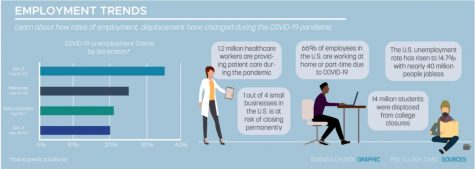
On top of assuming more chores around the house that were previously done primarily by her parents,Blumberg, as the middle child, has assumed more duties in caring for her younger sister.
“Most of the time, (Blumberg’s younger sister would) ask my mom for help on the phone with math homework, but now because my parents are a lot more busy and low-energy with the pandemic, I’ve had to step in and kind of fulfill that role.”
This situation is far from unique to Blumberg. According to Time Magazine, “Many (teens) are also dealing with illness or loss of income within their families, or the frequent absence of a parent who is an essential worker, forcing them to take on more demanding roles at home.”
Despite having a different family situation than Blumberg, junior Leo Schneider, an only child, said he has experienced similar changes in his family dynamics that Time Magazine cites as a general trend among many teenagers.
“Before quarantine, I already had many responsibilities—my family makes sure each person has a responsibility around the house. So for example, I would be in control of the dishes, dishwasher, vacuuming, and would sometimes have to help with yard work,” Schneider said. “Since the pandemic, I’ve gotten more responsibilities to do since less of my energy is needed in other places like school. So each morning I would be handed an even bigger list of chores and activities that needed to be completed.”
As confirmed by Amy Rexroth, clinical psychologist and owner of Carmel Psychology, this pandemic has especially strained the role of teenagers, something the media tends to overlook with its focus primarily on adults.
“When we peel apart all of the family dynamics, everyone is dealing with the loss of what they expected life to be. A lot of people don’t realize it, but high schoolers have really been put in a tough position both to babysit, navigate and deal with their own trauma during this time,” Rexroth said.
But these heightened roles assumed by teenagers have shed light on another aspect: family bonding and dynamics.
“We’ve seen both good and bad trends during this time,” Rexroth said. “Many of the kids I talk to tell me that they’ve really appreciated having more old-fashioned family time. They’ve gone on bike rides, walks, (played) board games, and other activities they haven’t had time to do when we still had extracurriculars. But some of the challenges definitely include communication; we are all going through such novel times where we have no idea what to expect, communication can be tough within your family.”
Blumberg said she can attest to the good trends seen with family dynamics.
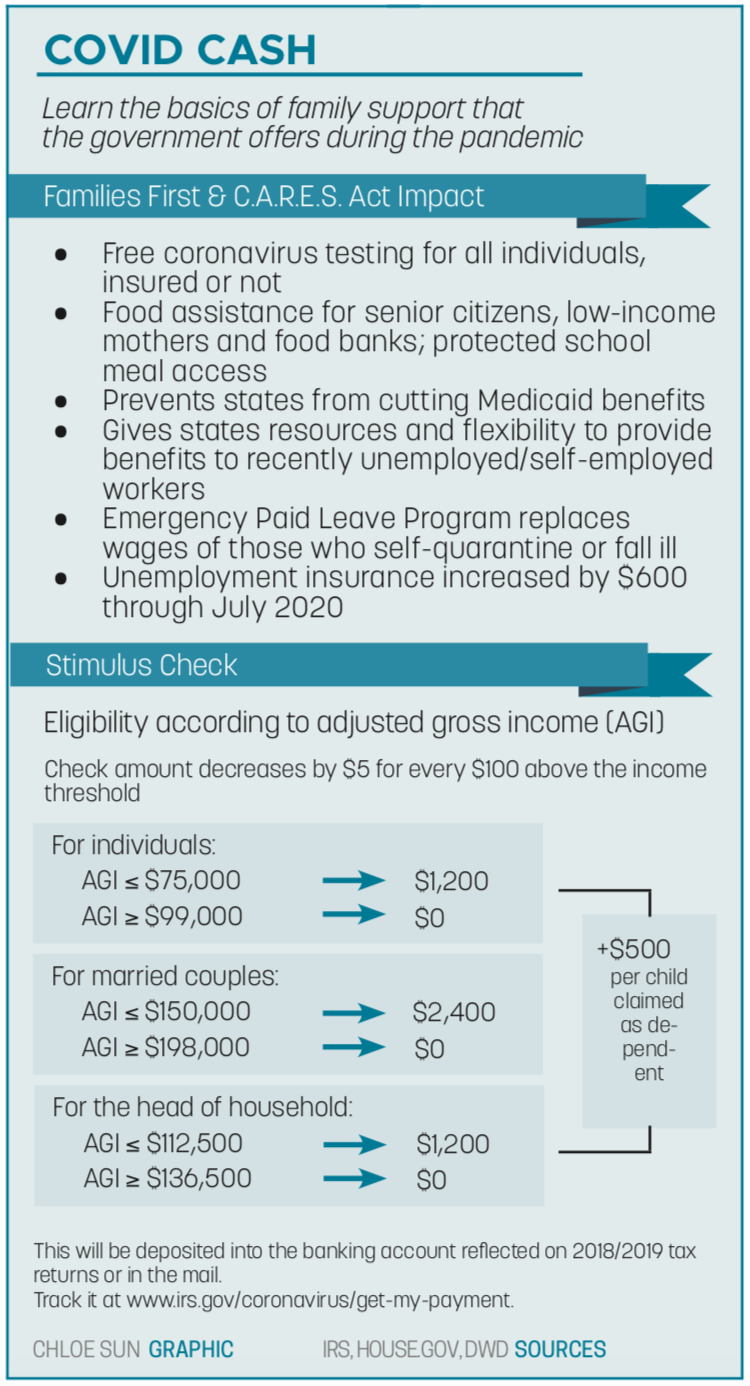
“I’ve especially gotten closer with my siblings because all of our activities are canceled and we’ve had to spend more time together, so it’s interesting to see how much more interactive we’ve all become with one another,” Blumberg said. “Since my older sister just started her first year at IU, it was weird seeing her come back early due to canceled trips, but the house definitely became a lot more lively and changed with her back.”
On the other hand, Schneider said he has experienced some of the more negative trends explained by Rexroth.
“Throughout this quarantine, my family has been really stressing me out about trying to become closer to each other,” Schneider said. “While this break has definitely allowed for families to get closer, this has kind of done the opposite for me since we are all trying to find new ways to fill the time and they often conflict with one another.”
In the end though, the bonding and increased family time spent that has come as a result of quarantine has provided valuable memories and lessons that Rexroth states will benefit teenagers in the long run.
“We are learning important life skills that there wasn’t time to focus on when we were running at such a vigorous pace before,” Rexroth said. “For example, spending time, bonding, communicating and navigating family dynamics are skills and things that are going to carry on far beyond this. Especially because people have been realizing that the slower pace of life has really showed tenderness with spending time with families, these interactions and memories will really be held on to and will be a more permanent change even after this passes.”
However, the pandemic has not only provided benefits for teenagers, but also serious negative implications. In fact, studies show that although they are less likely to suffer the most severe health effects of COVID-19, teenagers and young adults are feeling the pandemic’s social impact more acutely than any other age group.
According to Pew Research Center, teenagers and young adults were more likely than any other age group to experience high psychological distress when thinking about the outbreak. Those aged 16 to 24 are also disproportionately more likely to face COVID-19 layoffs because they make up 24% of employment in higher-risk industries such as restaurants, retail and transportation.
“I think with the teenage group, this is probably one of the first exposures to a crisis as young adults, so this will definitely provoke a lot of distress, but can also later provoke a resilient attitude if handled correctly,” Rexroth said. “So I think we’re really going to get some strong growth out of this.”
For Schneider specifically, one major concern has been the lack of social interaction.
“I’ve really had no major worries except for how it would feel to see people again and how much they’ve changed,” Schneider said. “It’s interesting because I would say I’ve become more introverted since quarantine because I was forced to adapt to less interaction. It was hard at first because before, for example, I loved to see people and party on the weekend, but now I’m able to enjoy more things that I can do alone.”

According to Rexroth, for those who have been struggling during quarantine with worries and anxieties, there are easy ways to convert the negative and anxious worries common among many teenagers to a more positive growth.
“First off, it’s really important to identify any anxieties,” Rexroth said. “Remember that there are no wrong emotions, especially during this time. It’s important to properly point out your feelings and tell yourself ‘This is awful, but I’m going to get through it.’ Sit in your bad feelings for a bit and come to terms with it, then get back in the game.”
Different methods of coping and relaxation during this pandemic can manifest in many different forms. For Schneider specifically, he said he likes to take time for himself and take a step back from the many responsibilities he’s had to take on during this time.
“I like to ease the worries by being a free spirit. Now that there’s really no true responsibilities except for my chores, I enjoy getting out of that routine life and being adventurous, just to forget about any worries I might have. Just doing what I enjoy is the key, and finding ways to better myself always makes me feel a bit better.”
Blumberg reacts similarly to the increased stress as Schneider. “I’ve been also taking more time to focus on myself, oftentimes just in my bedroom,” Blumberg said. “Thanks to the free time we’ve had during quarantine, I’ve seen myself have a bigger role in both the family and personal aspect of life.”
Despite the obvious negative implications that have come as a result of COVID-19, both Blumberg and Schneider said they have cherished the unpredictable shift in family dynamics that have accompanied the entire pandemic due to the valuable lessons taught and many memories gained.
Blumberg said, “This whole pandemic has really taught me that I really do rely on my family. Now, I’m doing a lot of the jobs I never really had to do like cooking dinner or cleaning the house or getting groceries. I’ve become a lot more appreciative for my family for assuming those roles prior to COVID-19.”
Even more, Schneider said, “This pandemic has taught me that I’m the only one who is responsible for my happiness. If I can’t find a way to fix a problem myself, or find a way to fill the time, then that is a problem in itself. With weird times like this in which you can’t control anything, I’ve had to learn that I can only control me and how I see the world.”
